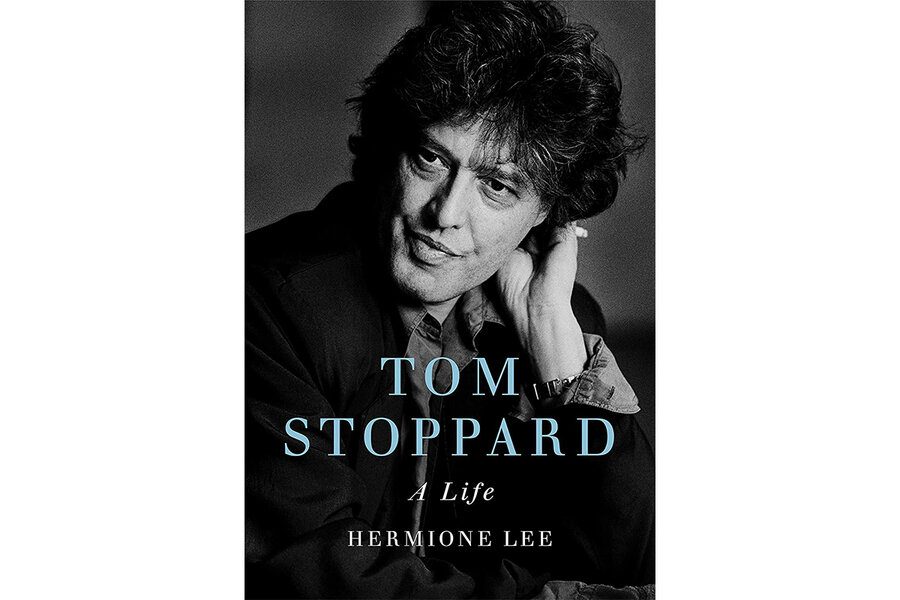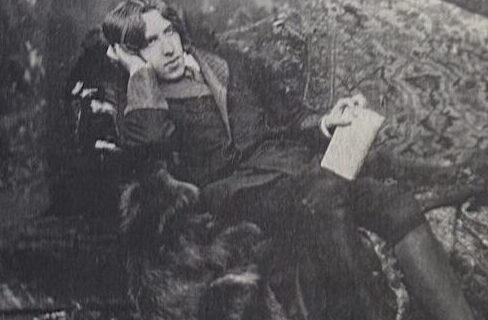Casual notes on show-biz books, memoirs and studies, dust gatherers and hot off the presses.
Book Review by Samuel L. Leiter . . . .
- Richard Ellman. Oscar Wilde (New York: Vintage Books, 1988), 680pp. Illustrated and indexed.
- Hermione Lee. Tom Stoppard: A Life (New York: Vintage, 2020). 872pp. Illustrated and indexed.
4th edition
This edition of Leiter Looks at Books looks at a pair of acclaimed biographies of great modern playwrights, both of whom made their careers in Great Britain although born elsewhere. Oscar Wilde was born in Ireland in 1854, Tom Stoppard in Czechoslovakia in 1937.

Richard Ellman’s Oscar Wilde, published 36 years ago, is a granular study of the poet, playwright, wit, aesthete, and all-round litterateur, whose drawing-room comedy, The Importance of Being Earnest, remains one of the most frequently revived works of the 1890s. Ellman looks closely at Wilde’s diverse writing and abbreviated life—he died in 1900 at 46— but, since Ellman generally avoids providing summaries of what he’s analyzing, it helps to have some knowledge of the major poems, plays, and essays.
Ellman’s elegant exposition of Wilde’s theories and themes can occasionally be a bit dense, making some sections a bit of a slog (I read the book piecemeal over several months), but his depiction of Wilde’s unusual life and world in late Victorian England is by and large absorbing. Of particular interest is the coverage of Wilde’s legal troubles in the late 1890s, when his love affair with the much younger Lord Alfred Douglas led to Wilde’s failed suit for libel against Douglas’s unsympathetic father, the Marquess of Queensbury (the man who wrote the rules for modern boxing); this was followed by a trial that led to Wilde’s imprisonment for his homosexual activities. Wilde’s suffering while incarcerated, followed by several years of social disgrace and penury, are closely examined, as is the illness that took his life.


In The Importance of Being Earnest, Wilde wrote one of the wittiest of modern comedies, but—in addition to plays like A Woman of No Importance and Salome—he was also responsible for a number of nontheatrical masterpieces, among them Ballad of Reading Gaol and De Profundis, both inspired by his time in prison and The Portrait of Dorian Gray, which itself has inspired several dramatizations and films.
If you want to know more about Oscar Wilde and his literary and artistic friends, not to speak of the social opprobrium visited on homosexuals at the time, there are few sources better to begin with than Richard Ellman’s book (which, by the way, never uses the word “gay”).


For all his genius, Oscar Wilde was not the greatest English-speaking playwright of his time, an honor undeniably belonging more rightly to another Irish writer, George Bernard Shaw. In 2024 I’d venture to say the greatest living dramatist writing in English is Tom Stoppard, although, perhaps, not as many who agree about Shaw would feel the same about Stoppard. After reading Hermione Lee’s magnificent, nearly two-inch-thick biography of Stoppard, I find it hard to think of anyone as worthy of the appellation.


For sheer output, consistency, intellectual and artistic rigor, commercial success, and critical renown, it’s hard to come up with anyone comparable, regardless of what language they write in. The man has surely won more titles and accolades than any other contemporary playwright, and it would seem only a matter of time before he receives, as did the late Harold Pinter, his closest competitor but also good friend, the Nobel Prize for Literature.
Stoppard (who distrusted biographies) selected Lee for the task, but her biography, while highly complimentary, is far from hagiographic. The picture she paints of this unusually successful writer, as treasured a human being as he is an artist, displays not only his genius but his weak spots. You put down this immense work of research, description, and analysis feeling you not only understand Stoppard better (if not, given his proclivity for intellectual hijinks, completely), but also wishing to revisit his work, especially the plays you’ve never somehow missed.
In a story of which we’ve heard a number of variations in the post-Nazi days, Stoppard, born Tomás or Tomik Straüssler in Czechoslovakia in 1937, was an infant when his family—non-observant Jews—was forced to flee his homeland. He spent his early years in Singapore and then India, raised in Darjeeling by his mother, Marta, after his father, a doctor, was killed. Marta’s marriage to the British officer Kenneth Stoppard allowed the family to move to England where Tom and his siblings grew up, considering themselves English, with few ties to their Czech language or culture, much less to their Jewish heritage.


Lee goes into great detail about Stoppard’s education (he never attended university, it should be noted), his early career as a journalist in Bristol, and his transition to writing plays, a trade at which—with 1968’s internationally popular Rosencrantz and Guildenstern Are Dead—he quickly found success. Her book explains not only the production circumstances of all his plays, but discusses their often difficult-to-grasp subjects: quantum physics, Fermat’s Last Theorem, or the nature of consciousness, anyone?
Stoppard’s theatrical playwriting output is extensive, of course, with widely known (and often revived) titles such as Travesties, The Real Thing, Hapgood, Arcadia, Indian Ink, The Coast of Utopia, Rock ‘n’ Roll, The Hard Problem, and Leopoldstadt. But he also wrote major movie and TV scripts, like Shakespeare in Love (co-authored with Marc Norman) and TV’s Parade’s End (based on novels by Ford Madox Ford), contributed (often uncredited) to many others, adapted numerous European plays by writers like Schnitzler and Chekhov, wrote important radio dramas, and produced countless articles, speeches, and other written works. A key critical component Lee comments on is the balance in his dramatic writing between intellectual and emotional concerns; critics were so used to his brainy preoccupations that they were often surprised when Stoppard’s plays stirred their hearts.
His constant traveling to conferences and productions of his plays in far-flung corners of the globe are exhausting to read about; one can picture just how tiring they must have been for Stoppard, but he seems to have thought little of hopping on a plane to the States for a weekend of rehearsals or some other event before returning to the UK. Often, he’d be involved in several major projects at the same time, yet his stamina never seems to have failed him. Lee offers an excellent view of how, with the help of his top-notch PA, he was able to juggle so many balls.


Lee recounts Stoppard’s two marriages (to Miriam Stern and Sabrina Guinness, both exceptional women), his extended love affairs (most notably with the brilliant actresses Felicity Kendal and Sinéad Cusack), his life with his parents (warmly loving mother, emotionally distanced stepfather), his offspring (one of whom, Ed Stoppard, is a noted leading man), and his countless friends in high places. Many of these persons are themselves well-described, so you get a remarkably rounded picture of Stoppard’s life circumstances. Even his various homes are examined closely, making it possible to imagine what visiting him might have been like.
Theater buffs will relish Lee’s coverage of his rehearsals, noting how actors and directors felt about working with Stoppard, who, while his own directing experiences were limited, was a keen participant in both new productions and revivals. He was an inveterate reviser, his published plays often undergoing several editions to reflect changes made in recent productions. Sometimes he had to be asked to limit his advice to actors because it could interfere with the actual directors’ authority. But the book also offers invaluable insights into the working methods of leading directors, like Jack O’Brien, Trevor Nunn, and David Leveaux.
Also of interest are Stoppard’s politics. Although always taking a balanced view of life’s realities, his long-term tendency—based largely on his gratitude to England for his being able to live a charmed life there—was to favor Tory views, even to the extent of being a friend and supporter of Margaret Thatcher. Later, he moved more leftward, although never radically. Among his chief political activities, in which he was deeply involved, were those on behalf of writers in oppressive societies, which was one reason he became close friends with Czech playwright/political leader Václav Havel.


Despite his enormous success, financially and otherwise, Stoppard appears to be a generous, modest, even self-deprecating man, devoted to his loved ones. Apart from what the tabloids made of his love life (Sinéad Cusack remained married to Jeremy Irons while consorting with the playwright), his life was generally scandal-free. Considered handsome and dashing in his salad days, and a buddy of leading celebrities (like Mick Jagger, to whom his appearance was sometimes likened), he was ripe for paparazzi exploitation, but managed to keep his head without falling into the typical patterns of drug or alcohol abuse; his chain-smoking, however, was in a class by itself.
For many, the most intensely gripping part of Stoppard’s life was his eventual exploration of his Czech origins and Jewish roots. Having generally ignored his religious heritage, his own mother having willfully chosen to keep silent about it, Stoppard only began to dig into his Jewish roots in the 1990s. He made contact with surviving Czech relatives, discovering how many of his family members died in the Holocaust. This all proved fodder for his late plays Rock ‘n’ Roll and, most spectacularly, Leopoldstadt. Although I already was familiar with the story, reading it here brought tears to my eyes.
Hermione Lee’s book covers Stoppard’s life through the London success of the latter play, which would go on to an equally acclaimed New York production. It concludes with a fascinating discourse by Lee on the process of writing the biography, as well as a summation of her subject’s personality. If Tom Stoppard is, indeed, the world’s foremost living playwright, I can’t imagine a better way to get to know the guy than through this thorough portrait of his life and work.
Next up: Eila Mell, The Tony Awards


















